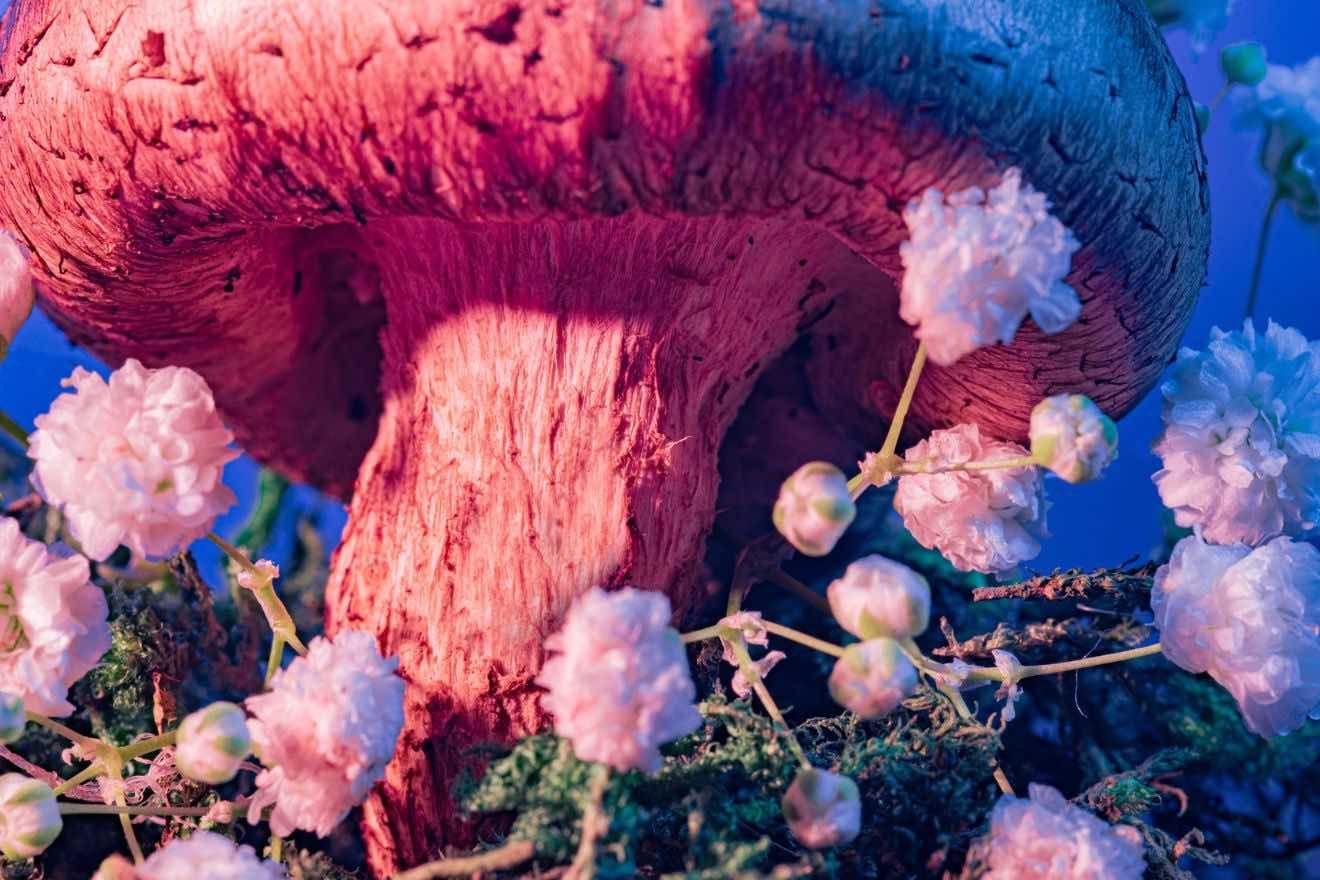If you’re reading this, you might already know that psychedelics have experienced a research resurgence in the last several years. MDMA is in final trials for PTSD before applying for FDA approval next year. Psilocybin is also in late-stage trials for treatment-resistant depression. But could these fascinating substances help treat autoimmune diseases? Let’s talk about the science.
At Psychedelic Support, we’re closely following clinical trials as we create courses for psychedelic therapy and neuroscience research. Much of the studies we’ve seen around psilocybin, MDMA, LSD, and others, is on their ability to help with mental health problems. These include depression, PTSD, anxiety, eating disorders, and more.
Follow your Curiosity
Sign up to receive our free psychedelic courses, 45 page eBook, and special offers delivered to your inbox.It’s thought that psychedelics help people heal from these conditions by creating new neural pathways. They may increase our plasticity, allowing us to develop new thought patterns after experience. A new model for experiential medicine could enable people to experience better outcomes from treatment-resistant diseases and help them achieve a new level of growth and self-healing.
Some researchers believe that psychedelics could also be a tool in treating physical and mental ailments. The psychedelic processes that spur neural growth could also affect our self-defense systems. Psychedelics also modify our immune responses by working on signal pathways.
These pathways are essential in the following processes:
- Inflammation
- Increases in cells
- Cell survival
Our cells’ ability to carry out these basic tasks allows us to fight disease, heal, and much more. If psychedelics can cause changes in these cellular processes, there’s massive potential for these substances to help us treat a variety of physical and mental ailments. These include autoimmune diseases, inflammatory disorders, cancer, and infections.
Autoimmune diseases alone affect about 50 million people in the US. That’s about 20% of the national population. More than 80% of people affected by these ailments are women.
We’re learning that more and more diseases have autoimmune origins. Diseases like depression, atherosclerosis, rheumatoid arthritis, multiple sclerosis, schizophrenia, and more could originate in an overactive inflammatory response.1
But how do psychedelics work on cellular signal pathways to influence the immune system? What evidence do we have so far to support these claims? Let’s talk about the science of psychedelics and autoimmune diseases.
Psychedelics and Autoimmune Disease: Where Is Current Research?
Little research has been done on this front of psychedelic medicine. The illegality of these substances makes them difficult to investigate. The latest research paper on psychedelics and autoimmune disease came out in 2020, titled psychedelics as a novel approach to treating autoimmune conditions. In it, researchers wrote:1
“We propose that psychedelics hold the potential to attenuate or even resolve autoimmunity by targeting psychosomatic origins, maladaptive chronic stress responses, inflammatory pathways, immune modulation, and enteric microbiome populations.”
Many scholars are expanding their perceptions on which diseases psychedelics can treat because we’ve come to understand more about these diseases. You may be surprised by some of the conditions now considered autoimmune.
Changing Our Ideas of Autoimmune Disease
In the last few years, medicine has broadened its idea of what constitutes an autoimmune disease. Several diseases and disorders we thought came from other causes are now being re-interpreted as autoimmune-related illnesses.
These autoimmune diseases include:
- Major Depressive Disorder
- Schizophrenia
- Alzheimer’s Disease
- Parkinson’s Disease
- Amyotrophic Lateral Sclerosis
- Cardiovascular Disease
- Chronic Fatigue Syndrome
But what do these illnesses have in common? What makes them newly classified as autoimmune diseases? Let’s answer these questions so we can understand how psychedelics could help with this wide range of diseases.
Characteristics of Autoimmune Diseases
Currently, over 100 diseases are defined as having autoimmune origins. There are eight characteristics these autoimmune diseases have.
8 Characteristics of Autoimmune Disorders:
- Inflammation: Autoimmune diseases come from an overreaction in our immune systems. This causes inflammation, which is often chronic or intermittent.
- Infections: Pathogens can trigger autoimmune diseases, and some people are more genetically predisposed to this phenomenon than others. Nearly all autoimmune diseases have been linked to some initial infection. Sometimes, viruses and bacteria look like your own cells, so your immune system attacks your body along with pathogens. Other viruses can hijack your immune system, reducing its ability to differentiate your cells from the pathogens.
- HPA Dysfunction: The Hypothalamic-Pituitary-Adrenal axis is critical to our stress response. When we’re stressed, activation along this axis causes glucocorticoids to release. These hormones act on several organs, telling them to redirect energy. High levels of stress hormones cause immune suppression and inflammation.
- Mitochondrial Dysfunction: Mitochondria help our cells create energy. When they become defective, they spill their DNA and RNA inside the cell. Here, immune sensors within the cell detect the genetic information as foreign and spur the overproduction of interferon. This inflammatory protein may contribute to many autoimmune diseases.
- Dysbiosis: This is an imbalance in a person’s microbiome. It means that the “good” bacteria, germs, or viruses in our bodies are overwhelmed by the “bad” ones. It can also mean the microbiome has shifted or moved.
- Trauma or Stress: Psychological processes affect how our immune system interprets threats. We’re learning more about how a person’s trauma history can affect their physical health. For instance, one study using veterans found that the risk for autoimmune disease was 58% higher among those who already had PTSD.
- Nutrient Deficiencies and Exposures: The immune system depends on certain nutrients to function. On the other hand, some trace elements like metals have been linked to autoimmune diseases.
- Gut Permeability: “Leaky gut” is when the junctures between cells in your intestine aren’t tight enough to contain gastrointestinal contents. This is thought to be caused by inflammation and leads to a chronic immune response.
Now that we understand the basic characteristics of autoimmune disease, it’ll be clearer which of these psychedelics could help treat them.
How Could Psychedelics Work on Autoimmune Pathways?
Psychedelics may modify several of these characteristics to treat autoimmune diseases.1
Psychedelics target the psychosomatic origins of disease, helping people get to the root of their trauma. People’s past trauma and stress may affect their ability to physically heal from autoimmune disease. By helping people process these feelings through psychedelic experiences, these substances could treat illness.
Psychedelics also could modify your chronic stress response, working to regulate your HPA axis. Current research suggests that psychedelics could drastically improve people’s stress levels and well-being. By bringing down chronic stress, psychedelics may work to decrease stress hormone production by the HPA axis.
Lastly, psychedelics may work on the enteric microbiome. You may already know that many psychedelics (LSD, psilocybin, and mescaline) work on serotonin receptors. Serotonin is essential for mood, cognition, gut motility, appetite, and basal body temperature. Psychedelics may represent a modifiable link between our gut and our brains.
Learn more about the link between psychedelics and the gut-brain axis on our blog.
Psychedelics could also reduce inflammation by working on the 5-HT2A serotonin pathways. This allows psychedelics to modulate the immune system, bringing down the inappropriate immune response in autoimmune disease. But is this link confirmed? Let’s talk about it.
Do Psychedelics Reduce Inflammation?
Yes, although research on this relationship is still in its early stages. We have some evidence that psychedelics could have inflammation-suppressing and immune-modulating effects. 5-HT2A serotonin receptors could be responsible for this effect.
For example, LSD can suppress the proliferation of B-lymphocytes and inflammatory cytokines in rats. These create an immune response and signal the immune system. Similar research has found a link in the relationship between 5-HT2A receptors (which LSD works on) and inflammation.
While we can see that some psychedelic processes could have a hand in suppressing inflammation, don’t expect to replace NSAIDs with LSD and psilocybin anytime soon. We’ve got a long way to go in research before we understand this relationship. But does the same link exist when the dosage of psychedelics is much smaller?
Can Microdosing Bring Down Inflammation?
Maybe, but we’re not sure yet. A 2021 study found that hot-water extractions from four different psilocybin mushrooms work on inflammatory mediators. By down-regulating these mediators (making them less sensitive), these mushrooms could have potent anti-inflammatory effects.
Still, we’re not sure what this means on the microdosing level. It might be that a small dose of psilocybin doesn’t have the anti-inflammatory effects of larger ones. More research is needed in this area.
Key Takeaways on Psychedelics and Autoimmune Disease
We’re not trying to claim that psychedelics will be a magic bullet for autoimmune diseases. We still have a lot of research to do before we can know for sure whether or not psychedelic medicine could help with these disorders.
We’re optimistic about psychedelic research, and we believe that the scope of psychedelic medicine will continue to expand past our current understanding.
If you’re interested in the growing science around psychedelics and healing, subscribe to our newsletter. Subscribing is free and comes with great perks. You’ll get exclusive invites to our expert speaker series, and early info on course additions and updates.
References:
- Thompson, C., & Szabo, A. (2020). Psychedelics as a novel approach to treating autoimmune conditions. Immunology Letters, 228, 45–54. https://doi.org/10.1016/j.imlet.2020.10.001
- Fairweather, D. L., Frisancho-Kiss, S., & Rose, N. R. (2008). Sex differences in autoimmune disease from a pathological perspective. The American Journal of Pathology, 173(3), 600–609. https://doi.org/10.2353/ajpath.2008.071008
- Herman JP, McKlveen JM, Ghosal S, Kopp B, Wulsin A, Makinson R, Scheimann J, Myers B. Regulation of the Hypothalamic-Pituitary-Adrenocortical Stress Response. Compr Physiol. 2016 Mar 15;6(2):603-21. doi: 10.1002/cphy.c150015. PMID: 27065163; PMCID: PMC4867107.
- U.S. Department of Health and Human Services. (n.d.). Autoimmunity origins may lie in defective mitochondria (environmental factor, March 2021). National Institute of Environmental Health Sciences. Retrieved August 15, 2022, from https://factor.niehs.nih.gov/2021/3/papers/autoimmunity/index.htm#:~:text=The%20accumulation%20of%20defective%20mitochondria,diseases%20through%20production%20of%20interferon.
- Bookwalter, D.B., Roenfeldt, K.A., LeardMann, C.A. et al. Posttraumatic stress disorder and risk of selected autoimmune diseases among US military personnel. BMC Psychiatry 20, 23 (2020). https://doi.org/10.1186/s12888-020-2432-9
- Cannas D, Loi E, Serra M, Firinu D, Valera P, Zavattari P. Relevance of Essential Trace Elements in Nutrition and Drinking Water for Human Health and Autoimmune Disease Risk. Nutrients. 2020 Jul 13;12(7):2074. doi: 10.3390/nu12072074. PMID: 32668647; PMCID: PMC7400883.
- Paray BA, Albeshr MF, Jan AT, Rather IA. Leaky Gut and Autoimmunity: An Intricate Balance in Individuals Health and the Diseased State. Int J Mol Sci. 2020 Dec 21;21(24):9770. doi: 10.3390/ijms21249770. PMID: 33371435; PMCID: PMC7767453.
- Flanagan TW, Billac GB, Landry AN, Sebastian MN, Cormier SA, Nichols CD. Structure-Activity Relationship Analysis of Psychedelics in a Rat Model of Asthma Reveals the Anti-Inflammatory Pharmacophore. ACS Pharmacol Transl Sci. 2020 Aug 13;4(2):488-502. doi: 10.1021/acsptsci.0c00063. PMID: 33860179; PMCID: PMC8033619.
- House, R. V., Thomas, P. T., & Bhargava, H. N. (1994). Immunological consequences of in vitro exposure to lysergic acid diethylamide (LSD). Immunopharmacology and Immunotoxicology, 16(1), 23–40. https://doi.org/10.3109/08923979409029898
- Nkadimeng SM, Steinmann CML, Eloff JN. Anti-Inflammatory Effects of Four Psilocybin-Containing Magic Mushroom Water Extracts in vitro on 15-Lipoxygenase Activity and on Lipopolysaccharide-Induced Cyclooxygenase-2 and Inflammatory Cytokines in Human U937 Macrophage Cells. J Inflamm Res. 2021 Aug 5;14:3729-3738. doi: 10.2147/JIR.S317182. PMID: 34385833; PMCID: PMC8352634.






